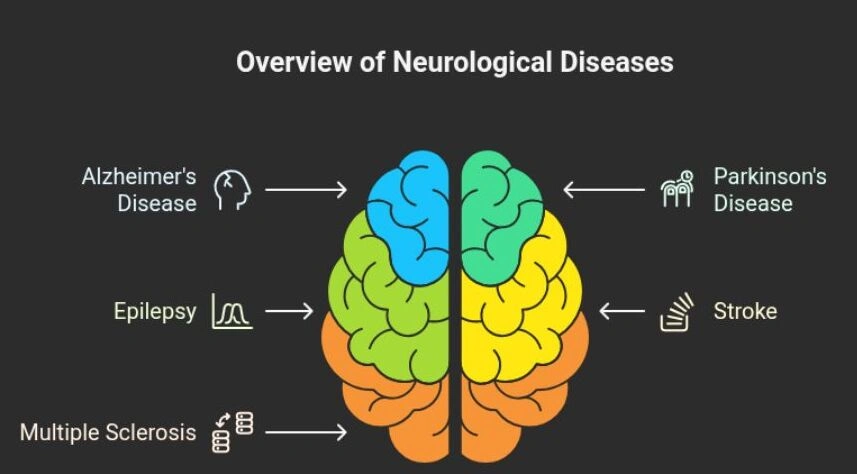Neurological problems have the potential to interfere with life in many ways, but prevention is truly possible.
Did You Know? Worldwide, up to one billion individuals have neurological disorders, as per the World Health Organisation. They vary from headaches to brain strokes and can be prevented through lifestyle modifications. Among Indians, one in every three individuals above 55 years of age exhibits early indicators of brain ailments such as memory loss or confusion.
Let’s discuss how you can avoid neurological issues before they begin.
Table of Contents
Understanding the Risk of Neurological Issues
Before leaping into prevention, you need to know what neurological problems are. They are diseases that involve the brain, spinal cord, and nerves. They include:

- Alzheimer’s disease
- Parkinson’s disease
- Epilepsy
- Stroke
- Multiple sclerosis
And many others from the list of nervous system disorders. These problems can affect memory, movement, and even mood. You can also read a blog on Neurological Disorders in Children by click here.
Top 10 Ways to Prevent Neurological and Brain-Related Disorders

1. Stay Mentally Active
Brain exercises such as puzzles, chess, and reading keep your mind active.

- Try to learn a new language.
- Play brain games.
- Read books on a regular basis.
Research indicates that mentally active individuals are less likely to experience dementia.
2. Eat a Brain-Boosting Diet
Food fuels your brain. A healthy diet can ward off most neurological disorders.

Here’s what to eat:
- Fatty fish (high in omega-3)
- Leafy greens (high in folate)
- Nuts and seeds (high in antioxidants)
- Whole grains (improve blood flow to the brain)
This kind of diet can reduce the risk of cognitive decline.
3. Exercise Regularly
Exercise is essential to maintain your brain’s health.

- Walk 30 minutes a day.
- Yoga for mental relaxation.
- Aerobic exercises to enhance blood flow.
Exercise alleviates neuro problem symptoms and enhances mood.
4. Get Quality Sleep
Sleep rejuvenates your brain. Without it, you can develop neurological symptoms such as confusion, poor concentration, and loss of memory.

Tips to sleep better:
- Avoid screens at night.
- Fixed sleeping schedule.
- Reduce caffeine and sugar at night.
Disturbances in sleep are symptoms of neurological diseases such as Alzheimer’s. Also go throu our blog on Top Reasons to See a Neurologist for a Sleep Disorder for more informations.
5. Control Blood Pressure & Sugar
Hypertension and diabetes pose a risk for brain-related diseases such as brain stroke and dementia.

Ways to manage them:
- Routine health check-ups
- Reduced salt and sugar.
- Adhering to prescribed medication
Controlling these variables can postpone or prevent neurological brain disorders.
6. Avoid Smoking and Limit Alcohol
These habits damage the brain and nervous system directly.

- Smoking cuts off the oxygen supply to the brain.
- Excessive alcohol destroys brain cells.
This makes one more susceptible to a neuro problem and speeds up mental deterioration.
7. Manage Stress Actively
Long-term stress causes neurological symptoms such as anxiety and memory loss.

Effective stress-busters:
- Meditation and mindfulness
- Spending time with loved ones
- Breathing exercises
Stress is an underlying reason for neurological diseases such as migraines and insomnia.
8. Protect Your Head
Injuries are a leading cause of neurological disorders treatment later in life.

Safety tips:
- Always wear a helmet when cycling
- Wear seat belts in vehicles
- Avoid dangerous sports without protective gear.
Head injuries tend to have symptoms of long-term neuro problems.
9. Stay Socially Connected
Depression and brain decline can result from social isolation.

Keep your mind active through:
- Regular discussion
- Volunteering
- Taking group classes or spiritual meetings
A robust social support system assists in avoiding brain-related diseases.
10. Early Diagnosis and Expert Consultation

If you experience memory problems, sudden confusion, or loss of coordination, don’t disregard them. They are potential early symptoms of a neurological disorder. Approach a brain problem doctor urgently. Early diagnosis assists in quick recovery.
For professional advice, always contact an experienced neurosurgeon in Hyderabad who is renowned for innovative treatment methods.
Table: Common Causes vs Preventive Tips
| Causes of Neurological Disorders | Prevention Methods |
| High blood pressure | Monitor and control it regularly |
| Poor diet | Follow a Mediterranean-style diet |
| Lack of exercise | Walk or do yoga daily |
| Smoking and alcohol | Quit smoking, limit alcohol intake |
| Head trauma | Wear helmets and use seat belts |
| Chronic stress | Practice mindfulness, seek support |
| Sleep deprivation | Follow a proper sleep routine |
When to See a Neurologist?
Here are the symptoms you can’t ignore:
- Recurring headaches or migraines
- Walking or speech difficulties
- Confusion or memory loss
- Numbness or tingling in the hands/feet
- Vision loss suddenly
These could be neuro problems symptoms requiring neurological disorder treatment immediately. Always rely on the top neurosurgeon in Hyderabad for a proper diagnosis and professional care.
Get in Touch and Protect Yourself from Brain Disorders
Neurological problems don’t occur overnight. They build up over the years due to lifestyle and overlooked warning signs. Brain health is equally as important as heart or body health.
If you or your loved one experiences symptoms of neurological problems, don’t wait. Act early, consult a renowned expert like Dr Raveesh Sunkara, one of the best brain problem doctors. For more insights, you can visit our website or contact us.
FAQs
What is a neurological problem, and how does it start?
A neurological problem is any abnormality affecting the nervous system. Often, this starts with mild symptoms like headaches, memory loss, or confusion.
What are the usual neurological symptoms?
Numbness, balance difficulties, vision problems, memory loss, and speech problems are the usual neurological symptoms patients experience.
How are neurological disorders treated?
It depends, since treatment for neurological diseases varies widely based on the disease. Treatment may include medications, surgery, therapy, or lifestyle changes.
How are neurological disorders treated?
It depends, since treatment for neurological diseases varies widely based on the disease. Treatment may include medications, surgery, therapy, or lifestyle changes.
Who is a good physician for the treatment of brain disorders?
See a specialist for proper diagnosis and advanced treatment. For example, consult with one of the best neurosurgeons in Hyderabad, Dr Raveesh Sunkara.
Can neurological diseases be prevented?
Yes. Exercise, eating healthy meals, and maintaining your health, including stress levels, along with routine visits to your medical doctor, can help avoid most neurological disorders.







